14 Easter Table Decor Ideas Using Spring Flowers
Gather seasonal flowers from the garden and use them to create table settings, centerpieces, and unique decorations – for the most beautiful Easter celebration.
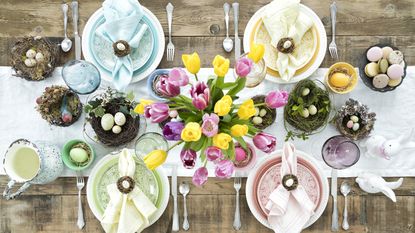

Easter is a truly magical time of year. After the bleakness of winter, there is such a strong sense of optimism as the natural world awakens, and spring blooms begin to fill our gardens with joyful pops of color.
Let these seasonal delights form the basis of your Easter table decor ideas. From stunning Easter centerpiece plants to simple place-setting ideas, there is so much scope to personalize celebrations.
Many gardeners already grow the perfect flowers for Easter decor. Whether you want to make a display of colorful tulips, cheery daffodils, pretty pansies, or ethereal hellebores, you can make the most of your garden's bounty. Otherwise, buy seasonal flowers from local florists or the grocery store.
BEAUTIFUL EASTER TABLE DECOR IDEAS
These pretty Easter table decor ideas use widely available spring flowers and other easily accessible materials.
From quick and easy arrangements that have a big impact, to more involved projects that will flex your creative muscles, there are options to suit all tastes and skill levels.
1. Fill jars with spring flowers
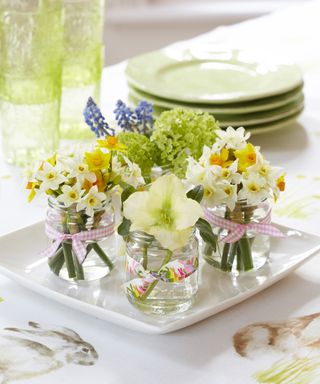
You don't need floristry skills to make this simple glass jar flower arrangement. It's as easy as it is effective. Use old jars, milk bottles, or small vases – mismatching designs work well for a charming vintage look.
Mini daffodils, grape hyacinths, and hellebores are great flower choices that will suit the scale of the jars.
Gardening tips, videos, info and more delivered right to your inbox!
Sign up for the Gardening Know How newsletter today and receive a free download of our most popular eBook "How to Grow Delicious Tomatoes."
For each jar, gather a small bunch of spring flowers in one hand. Use your other hand to arrange them in a slightly domed shape – with taller blooms in the middle, and shorter ones at the sides. Then snip the stems to the desired height – with the shortest flowers just peeking out over the top of the jar. Finish by tying a pretty ribbon around each jar.
Display your jars individually – perhaps one for each place setting – or group them as a centerpiece.
2. Get creative with silverware
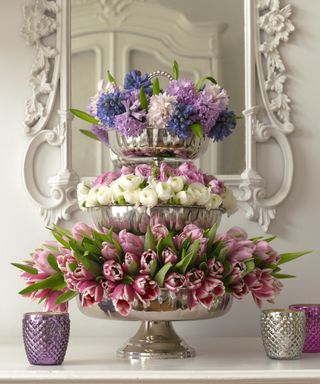
A silver cake stand filled with layers of spring blooms is one of the most elegant Easter table decor ideas. Combine complementary colors and use a different type of flower for each layer.
Here, tulips, ranunculus, and hyacinths in shades of pink, purple, and white look so pretty – the idea could also work well for a wedding.
Make sure the cake stand has lipped edges so you can add water to each tier and keep the flowers as fresh as possible.
3. Create a rustic egg candle holder
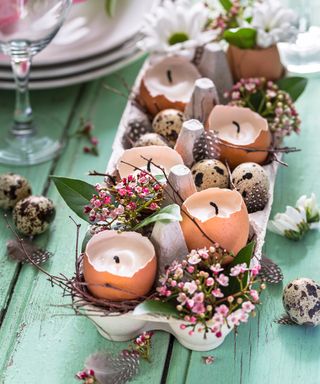
This egg carton candle holder is a sweet idea for a rustic country centerpiece. You can use a cardboard carton but a ceramic egg tray looks more elegant. Choose one that holds a dozen or six eggs, depending on the desired scale.
Fill half of the holes with twigs and seasonal flowers from the garden – tiny spring blossoms and singular flowers both work well. Add a few small decorative eggs or quail eggs.
To make eggshell candles, you will need soy wax flakes and wicks. You can buy wicks in different lengths, though they can be trimmed to size after the candles have set.
Carefully break open each egg, to preserve around two-thirds of the body of the shell. Empty out the eggs, clean the shells, and allow them to dry. If desired you can trim the shells to improve their shape, but broken edges look more natural. Place your eggs upright in an egg carton – preferably not the one you will use for the display, as you might spill wax on it.
Next, melt down some soy wax chips according to the packet instructions. Once ready, dip the base of the wicks in the wax and insert into the bottoms of the eggs, holding them in position until the wax is set. Gently straighten the wicks.
Fill each egg with wax, stopping about half an inch from the top of the shell. Allow to set, then trim the wicks to around a quarter of an inch long. When the wax is setting, you may need to adjust the wicks a little so that they sit centrally.
When lighting your candles, you must ensure that none of the flowers or twigs are positioned close to the flames, as it could present a fire hazard.
4. Decorate a cake with edible flowers
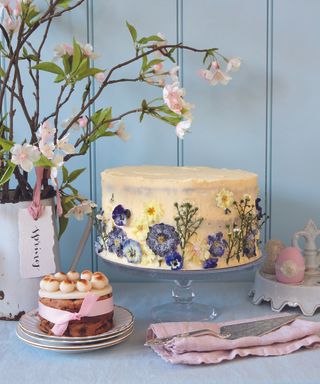
Decorate a centerpiece Easter cake with crystallized edible flowers. A surprising variety of flowers are edible, including pansies, violets, primroses, and cherry blossoms – all prevalent in spring.
To crystallize flowers, separate the white from an egg and put it in a small bowl. Pour a cup of superfine sugar into a blender and blitz it to create an extra-fine coating.
Take a fine new paintbrush and gently paint the egg white onto both sides of the flowers. Carefully sprinkle over the sugar, and gently shake off the excess. Place flowers on a sheet of greaseproof paper to dry.
The flowers will last a couple of weeks stored in an airtight container
5. Plant mini nests with spring bulbs
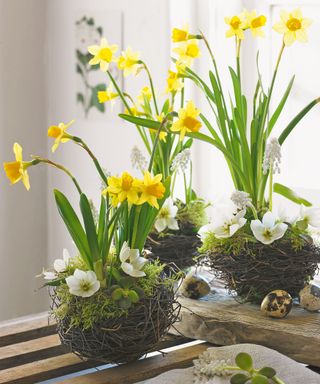
These mini nests make perfect Easter-themed planters for flowering bulbs. To recreate the idea, you will need a roll of grapevine garland, floristry wire, a small plastic bag, soil, moss, and your chosen bulb flowers – this project uses daffodils and white grape hyacinths.
Start by cutting off a short length of grapevine garland, and work it into a small, flat spiral, holding the shape together with floristry wire. Cut more lengths of grapevine, and add into the spiral, working upwards to create a nest shape. Secure with more floristry wire as you go.
When you have created a desirable nest shape and size, twist, cut, and tie off any loose ends of grapevine and wire. Place a small plastic bag inside the nest – trimming to size if necessary. The goal is to make the nest watertight. Add your bulbs, then fill the nest with soil.
Top with a layer of moss and add any other plants or flower heads as desired – consider trying succulents, anemones, hellebores, or Star of Bethlehem flower heads.
6. Gather a joyful place setting bouquet
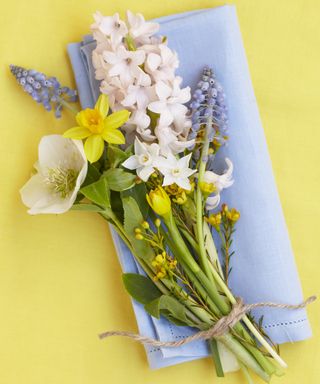
Go out to the garden and forage for seasonal blooms to make this beautiful napkin bouquet. A single hyacinth makes a big impact when arranged with mini daffodils, grape hyacinths, and hellebores. Add a sprig of foliage to fill it out, then tie with a piece of string.
The bouquet looks most effective teamed with a plain napkin in a complementary hue – here, blue perfectly coordinates with the grape hyacinths. Alternatively, white allows the flower colors to pop.
7. Arrange a blossom twig tree
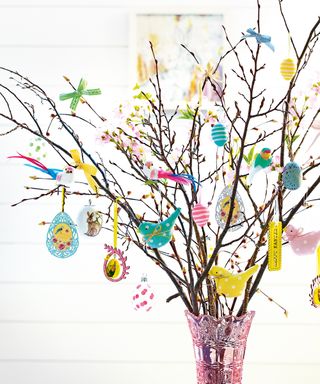
Arrange blossom stems into a vase or jug for a simple, yet impactful table centerpiece. Cherry, apple, or pear blossom are all stunning when in flower, and have sculptural branches.
This idea looks effective without any decorations, but to embrace the Easter theme, hang mini eggs and decorations from the branches. Clip on miniature birds for a whimsical feel.
If adding decorations to the branches, weight the base of the vase, to ensure it doesn't topple over. Sand works well.
8. Plant a colorful spring bulb centerpiece
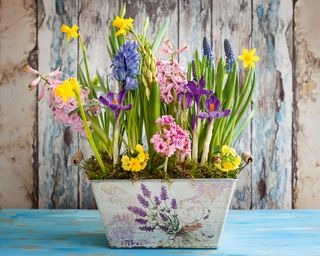
A planter brimming with colorful spring bulbs will create a lasting display that can be moved to the patio once the Easter celebrations are over.
Choose a vintage steel planter to add character to the decor, or a sleek modern design for a pared-back feel.
Many smaller spring bulbs can be planted quite close together to maximize their impact. This container uses hyacinths, daffodils, grape hyacinths, and crocus. Florist kalanchoe is used to break up the stems at the base.
Use moss to cover the soil in the planter, which gives the sense of an Easter nest.
9. Decorate chair backs with miniature arrangements
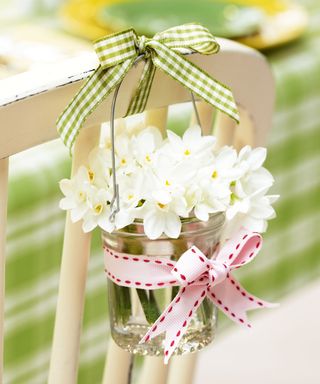
Add a final flourish to your Easter decor by making chair-back decorations. Use hanging glass jar tealight holders, tied to the chairs with ribbon.
Fill each jar with a handful of spring flowers – white daffodils are a classic choice. Add a small amount of water to ensure they don't wilt.
Finish by tying a ribbon around the middle of each jar, which will help to disguise the stems in water.
10. Use teacups as mini planters
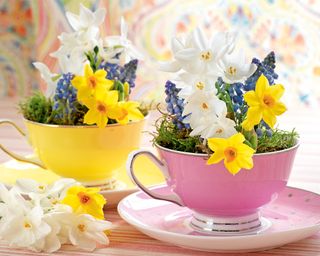
Vintage tea cups and saucers make such charming mini planters that can be dotted around a spring table. Add a name card to each teacup, and they can double up as place card settings.
To arrange your flower stems, you will need to add moss or a piece of floral foam to the base of each tea cup, to provide structure and help keep the flowers hydrated. This arrangement uses yellow daffodils, paperwhites, and grape hyacinths.
Trim your stems to the desired size and poke into the moss or foam to arrange. Finish by topping each tea cup with some moss or bushy twigs.
11. Frame place settings with pussy willow
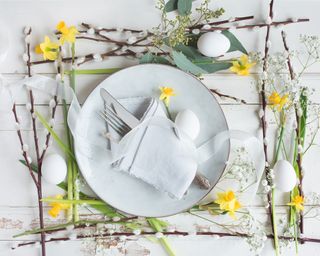
This is one of the cleverest yet simplest Easter table decor ideas, and it is so quick to achieve. Instead of using placemats, frame the dinner plates with an outline of pussy willow stems, trimmed to the desired size.
If there are no pussy willow trees nearby, then spring blossom would also work well.
Add mini daffodils and white eggs, then finish with a few sprigs of baby's breath – available cheaply from florists.
12. Craft a bird's nest centerpiece
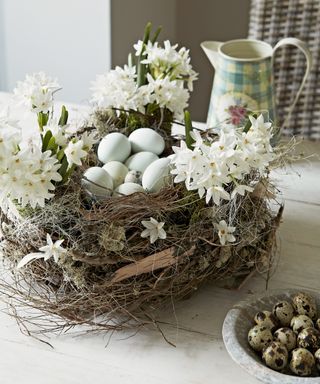
Fill a fake bird's nest with eggs – a mix of duck and quail eggs works well – then add spring flowers to make a rustic Easter centerpiece.
Fake bird's nests can be sourced cheaply online and from craft shops. However, you can make one using dried vining twigs, such as angel hair or grapevine. Alternatively, you may have some trimmings left over from spring pruning.
Use the base of a bowl to form the shape, and wrap your twigs around it, securing the shape with floristry wire. Add some moss to the design if desired.
Insert bunches – or single stems – of spring flowers. Paperwhites are an elegant choice. To prevent them from wilting and to make your arrangement last for several days, try packing your nest with moss or floral foam. You will need to first line the base of the nest with a plastic bag so that you can add water. Disguise it by covering it with more twigs or moss.
13. Make eggshell vases
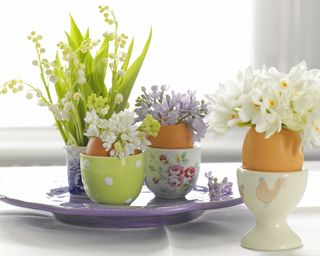
Fill eggs in egg cups with small spring flowers for a charming Easter breakfast table setting.
You will need to break the eggs carefully, so that the shells stay mainly intact with just the tops removed. Clean them out, fill with water and place into egg cups.
Small spring flowers will be most effective for this arrangement – try mini daffodils, paperwhites, lily of the valley, pansies, and violas.
14. Add an elegant touch with hellebores
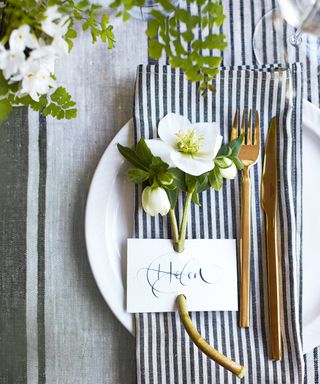
A single white hellebore stem used as a place setting decoration is the essence of elegance.
Punch holes into a beautifully calligraphed place name card, and thread through the stem to personalize the setting for guests.
Add vases filled with foliage and white spring flowers to complete the scene.

Melanie has worked in homes and gardens media for two decades. Having previously served as Editor on Period Living magazine, and worked on Homes & Gardens, Gardening Etc, Real Homes, and Homebuilding & Renovating, she is now focusing on her passion for gardening as a Senior Editor at Gardening Know How.
Melanie has spent the last few years transforming her own garden, and is also a keen home grower, having experimented with pretty much every type of vegetable at some point.
In her spare time, she loves to explore inspiring gardens and historic properties.
-
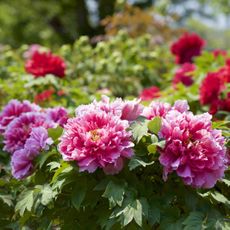 Types Of Peonies Every Gardener Should Know
Types Of Peonies Every Gardener Should KnowKnowing the different types of peonies helps when you want your garden to include these fabulous plants. Showy and always impressive, peonies are an elegant addition.
By Bonnie L. Grant
-
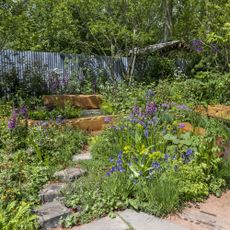 7 Sustainable Trends All Gardeners Should Take From The UK's Chelsea Flower Show
7 Sustainable Trends All Gardeners Should Take From The UK's Chelsea Flower ShowThe RHS Chelsea Flower Show 2024 is championing sustainability, with a focus on water conservation and creating resilient landscaping schemes in the face of climate change. Discover the key ideas to take away for your own garden.
By Melanie Griffiths